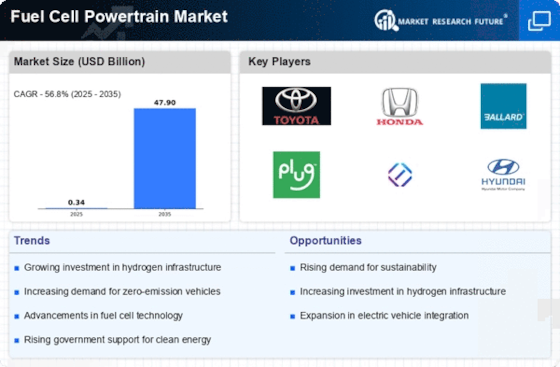Top Industry Leaders in the Fuel Cell Powertrain Market
*Disclaimer: List of key companies in no particular order
Top listed companies in the Fuel Cell Powertrain industry:
AVID Technology Ltd (UK)
Ballard Power Systems (Canada)
Brown Machine Group (US)
Ceres Power (UK)
Cummins (US)
Delphi Technologies (UK)
Denso Corporation (Japan)
ITM Power Manufacturers (UK)
Robert Bosch (Germany)
Bloom Energy (US)
SFC Energy (Germany)
The Race to Zero Emissions: Analyzing the Competitive Landscape of Fuel Cell Powertrain Market
The global fuel cell powertrain market is revving up, fueled by the relentless pursuit of zero-emission transportation solutions.
Key Player Strategies:
Tier 1 Suppliers: Companies like Bosch and Denso are leveraging their existing automotive expertise to develop and supply fuel cell components, catering to major automakers.
Established Fuel Cell Players: Ballard Power Systems and Cummins are focusing on technological advancements, improving cell efficiency and durability while reducing costs. Their strategic partnerships with OEMs like Toyota and Hyundai are propelling market penetration.
Emerging Asian Players: South Korean and Chinese companies like BYD and Great Wall Motors are aggressively investing in R&D, aiming to challenge the dominance of Western players with cost-competitive solutions.
Factors for Market Share Analysis:
Technology Leadership: Companies showcasing superior fuel cell performance and durability will naturally attract automakers and secure market share.
Cost Reduction: Bringing down the upfront cost of fuel cell vehicles (FCEVs) is crucial for widespread adoption. Innovative manufacturing processes and material sourcing hold the key.
Hydrogen Infrastructure Development: The lack of accessible hydrogen fueling stations remains a major hurdle. Companies actively collaborating with governments and energy providers to improve infrastructure will gain an edge.
Vehicle Platform Diversification: Expanding beyond passenger cars to include heavy-duty vehicles like trucks and buses opens up a vast untapped market. Players developing robust fuel cell solutions for these segments will gain significant traction.
New and Emerging Trends:
Solid-State Fuel Cells: This next-generation technology promises higher efficiency and operating temperatures, potentially making FCEVs more competitive with battery electric vehicles (BEVs). Companies like Toyota and Honda are heavily invested in this area.
Methanol Fuel Cells: Methanol offers easier storage and transportation compared to hydrogen, potentially easing infrastructure challenges. Companies like Johnson Matthey are pioneering this technology.
Integration with Renewable Energy: Fuel cell powertrains can be powered by green hydrogen produced from renewable sources, creating a truly zero-emission ecosystem. Companies like Cummins are actively pursuing this integration.
Overall Competitive Scenario:
The fuel cell powertrain market is a highly dynamic space with intense competition brewing between established players and emerging challengers. While cost remains a primary concern, technological advancements and strategic partnerships are key differentiators. Companies adapting to new trends and diversifying their offerings stand to capture significant market share in the race towards a cleaner transportation future. The future of mobility undoubtedly depends on who wins this race, and the stakes are nothing less than a revolution in zero-emission technology.
Latest Company Updates:
AVID Technology Ltd (UK): October 26, 2023: AVID partners with Toyota Material Handling Europe to develop fuel cell forklifts for the European market. (Source: AVID press release)
Ballard Power Systems (Canada): November 9, 2023: Ballard signs MOU with Danish hydrogen infrastructure company Everfuel to deploy 100 fuel cell buses in Denmark. (Source: Ballard press release)
Ceres Power (UK): October 31, 2023: Ceres Power announces successful testing of its BlueGen solid oxide fuel cell technology for heavy-duty trucks. (Source: Ceres Power press release)
Cummins (US): September 19, 2023: Cummins unveils its new HyLynix hydrogen engine platform for heavy-duty trucks. (Source: Cummins press release)










